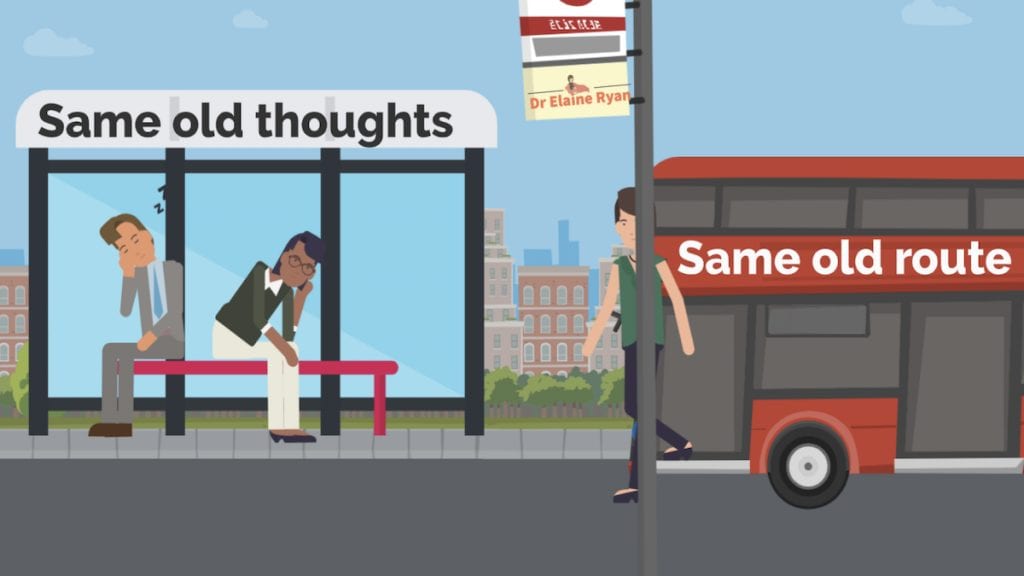What is ACT?
Acceptance and Commitment Therapy (ACT) is a model of therapy that uses mindfulness, acceptance, and behavioural change to help you overcome difficulties, focus less on painful experiences and ultimately lead the life you want. The name, Acceptance and Commitment stem from a central part of the model; accept what you cannot control and commit to actions that can improve your life.

A central tenet of ACT is that pain is unavoidable, but you may exacerbate your suffering by avoiding pain or using coping strategies that make things worse for you.
Often your suffering arises from not being able to accept what you cannot control and not being able to commit to things you value or enrich your life. Unlike other therapy models, for example, CBT focuses on changing your thought processes, ACT helps by teaching psychological flexibility. Rather than running from complex thoughts or avoiding unpleasant situations, Acceptance and Commitment Therapy helps you notice and accept your thoughts and feelings for what they are without getting overwhelmed by them and enables you to move toward the things in your life you value.

Retrain Your Brain
Online course for anxiety.
Based on Dr Ryan’s private practice
Will it make me worse if I have to accept painful thoughts and feelings?
People who come to me for therapy worry that confronting pain will make them feel worse. This is not how ACT works. All the elaborate attempts to avoid the pain result in your suffering. You might drink too much alcohol to prevent an uncomfortable emotion or take a back seat at work as you are too afraid to put yourself in the limelight. Not being able to tolerate the initial unpleasant sensation results in secondary pain, excess alcohol use, and dissatisfaction at work.
The idea behind ACT is to accept the uncomfortable emotion without getting overwhelmed by it and then work on the thoughts and feelings holding you back. You may often want to move forward in your life but get stuck. You might quit drinking but lapse after a week or two or find that you procrastinate over worthwhile things.
So what causes my problems?
According to ACT, psychological inflexibility is at the heart of your suffering. This inflexibility stems from how your thoughts hold you back, avoiding things that you dislike, speaking to yourself, dwelling on the past or worrying about the future and missing the present moment and the inability to do what you need to do to live life you want.
How do I become psychologically flexible?
We establish psychological flexibility through six core ACT processes. Aim to be open to all experiences, good and bad, while doing things consistent with your values.
Acceptance – noting and accepting all thoughts and feelings without getting overwhelmed.
Defusion – noticing your thoughts without engaging with them too much or trying to change them or avoid them forcefully
Values – deciding what is important to you
Committed action – having the ability to take the necessary steps to get what adds value to your life.
The present moment – aware of what is happening at this moment
Self as context – getting in touch with yourself.
Getting started with ACT.
You can try the FEAR acronym; I shall give a recent example that should help you use this for yourself.
Last night my thoughts were telling me I was messing up in life and not good at my job; I felt like a fraud. Even though I felt exhausted, I was ready to open my laptop and complete some outstanding work.
F = Fusion (stuff that goes on in your mind that does not help you)
E = Evaluation of the experience
A = Avoidance of discomfort
R = Reasons for what is happening
The antidote to FEAR is ACT
ACT: Accept your reactions and be present. Choose a valued direction; take action.
I try to think of my thoughts as ‘just mental activity in my head’ to gain distance from them in thought defusion. When you see your thoughts as just mental activity inside your head, it takes away their power, reduces the influence on your behaviour, and can act in line with values. In my case, I did not do all the extra work I thought would make me a better psychologist; I took my rest.
Further Reading PsychologyToday
